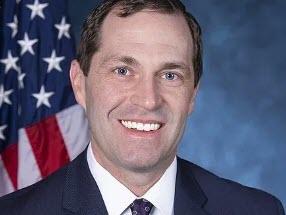House Manager Declares President Guilty Of… “Attempted Bribery”
Rep. Jason Crow, D-Colo., will be one of the seven Democratic impeachment managers prosecuting President Trump this week in his Senate trial. However, he seems a tad unclear on what the trial is about or at least what the defendant is facing as the allegations of impeachable conduct.
Crow declared on CNN’s State of the Union that Trump was really guilty of bribery. The problem is that bribery was rejected as an article of impeachment. Not only is it grossly unfair to go to trial while alluding to uncharged conduct, it is especially bizarre when the Supreme Court seems prepared to reaffirm the very case law that I cited earlier in rejecting such expansive interpretations.
On the show, Crow declared “Yeah, specifically he did attempt to bribe and coerce a foreign government official, in this case, the president of Ukraine.”
However, when asked if it was a mistake not to include a bribery article, Crow stated, “No, absolutely not.”
So it was appropriate not to charge him in an article of impeachment on bribery but it is appropriate to accuse him of that attempted crime before a trial?
I spent considerable time in my testimony and prior writings on why a bribery allegation was unfounded under current definitions and case law. I also testified against three other articles that were being touted by the House leadership. I was therefore pleased to see that the Judiciary Committee dropped previous claims of bribery, extortion, campaign finance and obstruction of justice as the basis for impeachment. I testified that the repeated assurances on these allegations from members, legal analysts, and my fellow witnesses were well outside the scope for these crimes. The Committee ultimately went forward with the only two articles that I believed were valid constitutionally in this situation: obstruction of Congress and abuse of power. However, it rejected my repeatedly effort to get the House to wait a couple months to prove these allegations and most importantly complete the record.
In an actual trial, the reference to uncharged criminal conduct would be viewed as patently improper. See e.g., United States v. De La Paz-Rentas, 613 F.3d 18, 25-27 (1st Cir. 2010) (finding prosecutors acting improperly in commenting that “the treachery of a renegade police officer who betrays his oath to protect the public” when “the defendants were not on trial for dereliction of duty and[, therefore,] the prosecutor had no business inviting the jury to focus on this aspect of their wrongdoing”).
The issue of uncharged conduct comes up fairly often in actual trials. It is usually however evidence of actual convictions. The suggestion of untried and uncharged crimes would be viewed as wildly inappropriate. Federal Rule of Evidence 404(b) bars prosecutors from using these convictions as evidence of a defendant’s bad character. It states
(1) Prohibited Uses. Evidence of a crime, wrong, or other act is not admissible to prove a person’s character in order to show that on a particular occasion the person acted in accordance with the character.
(2) Permitted Uses; Notice in a Criminal Case. This evidence may be admissible for another purpose, such as proving motive, opportunity, intent, preparation, plan, knowledge, identity, absence of mistake, or lack of accident.
In this case, there was no charge, let along a conviction, for bribery. Moreover, even when a conviction is allowed, it is also subject to FRE 403 which bar evidence or arguments that produce or threaten greater prejudice than probative value at trial. The reference to bribery is clearly designed to prejudice the minds of senators — and the public — which references to an actual crime.
As a former partner at a large firm, Crow must clearly be aware of why such references are viewed as presumptively unethical and unfair. With House managers accusing the Republicans of acting as unethical jurors, the managers may want to avoid the same charge in their own arguments.
Tyler Durden
Mon, 01/20/2020 – 16:25
via ZeroHedge News https://ift.tt/2NJv9HK Tyler Durden
